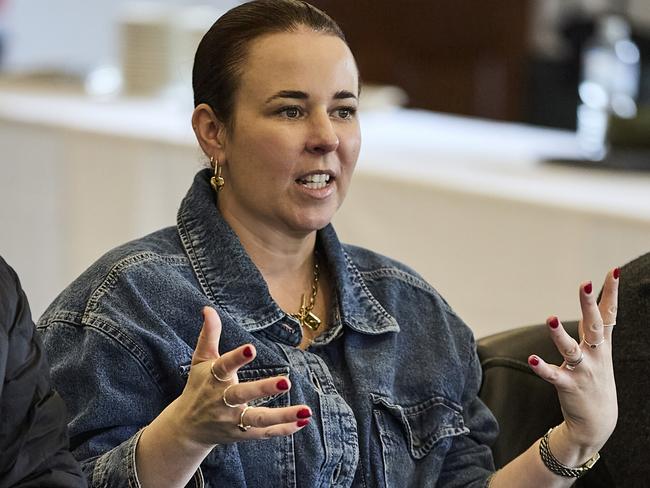One in four Australian girls feel unsafe around male students, and some bring weapons to school
A rise in toxic masculinity driven by the likes of influencer Andrew Tate is making more Aussie schoolgirls feel unsafe. Watch video.
National
Don't miss out on the headlines from National. Followed categories will be added to My News.
One in four Australian girls feel unsafe around their male peers with some bringing weapons to school, including knives, for protection.
For the first time a national survey, conducted by YouGov of more than 500 high school girls aged 14 to 18, has revealed how the rise of toxic masculinity being spread by online influencers is impacting them.
It found one in three were negatively affected, with those in private schools more likely to feel this way than those in public schools.
Of those affected, one in 10 admitted taking the extreme measure of carrying a weapon, like a knife, to defend and protect themselves, and a smaller number said they had turned to alcohol or substance use to cope.
Experts blame social media figures such as self-proclaimed misogynist Andrew Tate, who believes women belong in the home, can’t drive, and are a man’s property, for radicalising boys with toxic masculinity.
Tate, 37, a British-American former kickboxer, who is awaiting trial in Romania on allegations of rape, human trafficking and sexual exploitation, which he denies, produces short videos on ‘how to be a man’ which have been viewed billions of times.
Watch the video above.

A UK police report said the manosphere – populated by hyper masculine gurus like Tate, along with misogynistic websites and forums – was influencing a generation of boys, calling it a “national emergency”.
Paige Campbell, CEO of Tomorrow Woman, an organisation which hosts student wellbeing sessions and commissioned the survey, said while most of the negative behaviour was verbal, the survey found an “alarming percentage of impacted girls” have been physically bullied or harassed (22 per cent) or sexually bullied or harassed (21 per cent) – by their male peers.

CJ Ward, a 16-year-old Sydney student, said girls were feeling intimidated and harassed at school.
“I know someone who keeps a knife in her bag, just in case, because there is a boy who she talks to who aggressively asks her for nudes via Snapchat,” CJ said.
She claimed sexual assaults were happening at parties with boys pretending to be drunk in order to grope girls, or were assaulting girls who were drunk and passed out.

Boys were also making TikTok videos in the school corridors or at parties asking people personal questions, like who they thought was the hottest boy or girl, or whether they would ‘kiss or slap’ a certain person.
“There is a lot of pressure to answer these questions, often people are humiliated by them,” CJ said.
“One of the boys said in one of these videos that his job was a ‘certified rapist’.”
The video was later removed.
She said boys were being influenced by people like Tate, as well as violent pornography.
Out-of-date stereotypes were also resurfacing, with CJ finding herself in an argument with one male peer who said “women deserve to be in the kitchen”.
She said girls needed to stand up for themselves instead of believing, “I am a man’s thing” and that the toxic masculine environment was leaving some girls exhausted like “broken dolls”.
Melbourne student Ruby Singh, 17, said at other schools she had heard of boys ranking girls from marriage material to ‘un-rapeable’.
She said derogatory comments about women on social media, such as calling them sluts, or ‘bops’ which means the same thing, was normalising this type of language.
“Seeing that rising hatred is scary,” Ruby said.

Last year her class was tasked with writing an essay about Tate. In classroom discussions many boys said he wasn’t “that bad”.
“Even if they say it in a jokey way it still has an impact,” Ruby said.
She also complained that boys were not standing up for girls.
Ms Campbell said girls accused boys of dismissing or invalidating gender inequality and sexism, verbal bullying or harassment, and creating hostile classroom dynamics.
She said girls felt they were losing their voices.
“They’re not participating as much in class, they’re skipping classes, they’re feeling anxious and they feel like they’re taking up space,” Ms Campbell said.
Almost two in 10 affected girls reported that their academic performance had been negatively impacted by toxic masculinity.
Ms Campbell who works alongside Tomorrow Man, which runs sessions for boys, exploring topics like this, said they estimated that around five to 10 per cent of Australian boys were exhibiting misogynistic behaviour.

She said it was important for boys and girls to have their own space to be able to talk about their concerns, but ultimately the only way to make things better was by bringing both genders together to work through it.
“The situation has become more complex in the last few years, especially because of social media,” Ms Campbell said. “Boys are lost, they’re looking for answers. Andrew Tate has filled a gap; he’s given them a simple recipe to follow. He says if you do what I do, you will have fast cars, lots of money and lots of women.
“Unfortunately his version of what it means to be a man is negative and nasty and we need to show boys a different way.”
More Coverage
Originally published as One in four Australian girls feel unsafe around male students, and some bring weapons to school





